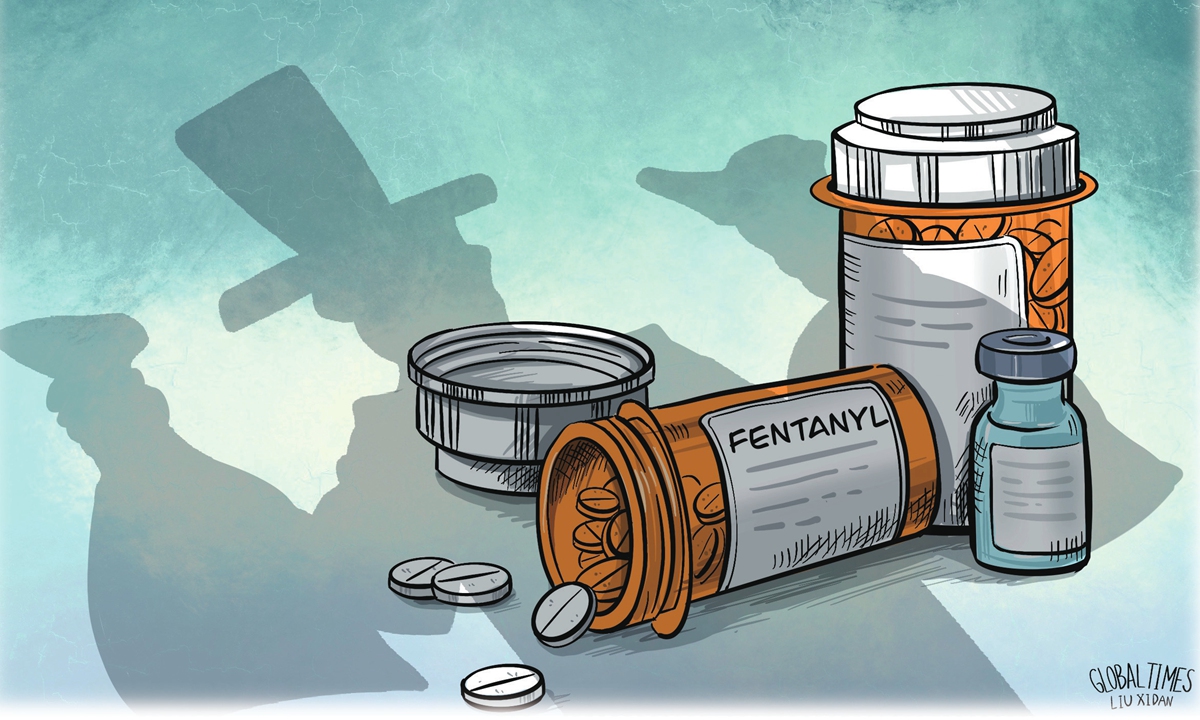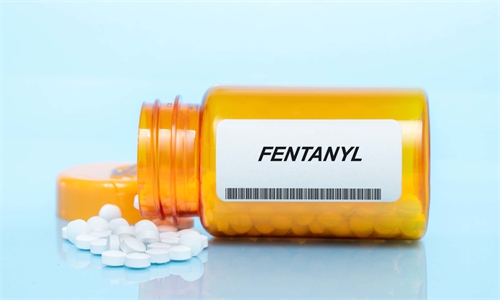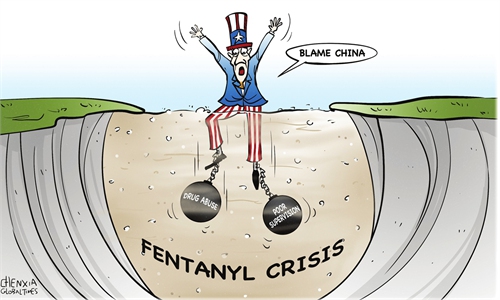
Illustration: Liu Xidan/GT
Just as China-US relations began to see signs of stabilization, extremist anti-China elements in US political sphere once again politicized the fentanyl issue, turning what should have been a cooperative agenda into one of confrontation and conflict.
The House Select Committee on China said on Tuesday in a report that China is subsidizing the production of fentanyl precursors for sale abroad and fueling the US opioid crisis. Voice of America published an article in Chinese with the headline directly accusing China of being the "prime mover" of US fentanyl crisis.
Opioid abuse is particularly severe in the US. In 2023, the overdose death rate topped 112,000 in a 12-month period for the first time. The root cause of the fentanyl abuse problem in the US lies in domestic factors such as lax regulation of psychotropic drugs, collusion between politics and business, political polarization hindering drug control efforts, inconsistent drug policies among states and insufficient social activities to raise the awareness about the dangers of opioid abuse. Unable to control the rampant spread of fentanyl drugs domestically, the US government, in order to shift blame, has repeatedly attributed the responsibility for the fentanyl crisis to China.
To smear China, the US absurdly claimed that China "strategically and economically benefits from the fentanyl crisis." The discussion of drug issues in the US has been politicized and manipulated, becoming increasingly irrational. If there are "beneficiaries," they are certain American politicians who manipulate issues to attract voters and vie for positions, Li Haidong, a professor at the China Foreign Affairs University, told the Global Times.
China took the lead globally in officially scheduling fentanyl substances as a class, implementing import and export licensing and international verification systems for all listed chemicals. In contrast, the US, as the country with the most prominent fentanyl problem globally, has not permanently scheduled fentanyl-related substances as a class, and one of the sources and reasons for opioid abuse in the US is the long-standing and widespread abuse of prescription painkillers domestically. This comparison is enough to see who is at fault for the rampant fentanyl problem in the US.
The "fentanyl precursors" are uncontrolled chemicals with an array of legal usages, and can be produced, traded and used by any company without reporting to the government. Furthermore, international practices require the importing company and country to ensure that imported goods are not used for illegal purposes. China sells fentanyl precursors to the US through legal channels, but once these drugs arrive in the US, how they are handled is beyond China's control, and the resulting impact should not be attributed to China.
Perhaps American politicians are calculating and attempting to use the fentanyl crisis to suppress China's medical industry, portraying China as a "dishonest businessman" willing to do anything for profit, experts said. China is the world's largest exporter of raw materials for most medicines, and what the US is currently doing is hoping to tarnish China, but ultimately it will only harm itself, said Lü Xiang, a research fellow of US studies at the Chinese Academy of Social Sciences.
US lawmakers from both parties claim that Beijing lacks sincerity in cooperating with Washington to address the fentanyl crisis, saying "China is still not doing enough." Mike Gallagher, Chairman of the Select Committee on China, even blatantly said, "We've had tens of thousands of deaths from fentanyl here in America, but zero in China. That just proves they could be doing more, but they're not."
However, from the establishment of the China-US bilateral Counternarcotics Working Group to carrying out dialogue and cooperation in such areas as counternarcotics on the phone between the two heads of state, China has continuously shown great goodwill and sincerity. China has never had an "obsession" with playing with the lives of people from other countries, nor does it seek to profit from it. On the other hand, it is the US that has frequently imposed unreasonable pressure and sanctions on China, severely disrupting and destroying China-US drug control cooperation.
The drug epidemic in the US is a problem of legal and social governance at home, and there is no need to insist on demanding answers from China. China-US drug control cooperation can only help create external conditions for the US to solve related problems. To truly eradicate the fentanyl crisis, the US should stop politicizing and instrumentalizing the fentanyl crisis. It should focus on improving its own legal system, patching up institutional loopholes, actively cooperating with China and working with the international community to address the drug problem.
Otherwise, the ultimate cost may have to be paid by the American people, who are tragically pushed into a drug epidemic by American politicians.
The author is a reporter with the Global Times. opinion@globaltimes.com.cn



